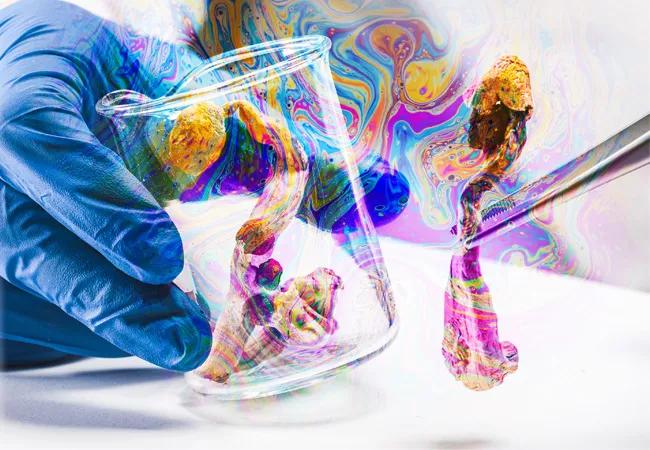Study shows a growing openness to the clinical potential of psychedelic treatments

Despite accelerating research on the therapeutic potential of classic hallucinogens (or ‘‘classic psychedelics’’), relatively little is known about how these compounds are viewed by American psychiatrists. Designed to capture evolving attitudes toward psychoactive drugs like psilocybin, lysergic acid (LSD) and mescaline, a new study reveals a distinctively positive shift in how hallucinogens are perceived by the psychiatric community.
Advertisement
Cleveland Clinic is a non-profit academic medical center. Advertising on our site helps support our mission. We do not endorse non-Cleveland Clinic products or services. Policy
Led by Cleveland Clinic psychiatrist Brian Barnett, MD, the follow-up study was modeled after a 2016 survey regarding psychiatrists’ opinions about hallucinogens and hallucinogen-assisted therapy. Until now, the original questionnaire – which was conducted by the same research group – was believed to be the only national survey published on the topic. Findings from the new 7-year follow-up survey were published in a recent issue of Psychedelic Medicine.
“There is a growing body of evidence to support the therapeutic viability of psychedelics for the treatment of depression, alcohol use disorder, posttraumatic stress disorder and a number of other mental health conditions, so we thought it was an optimal time to reassess how these drugs are viewed by those who are most likely to prescribe them: psychiatrists,” explains Dr. Barnett. “Although data from several recent, high-profile studies reinforce the safety and efficacy of hallucinogens in clinical settings, we were interested to learn to what degree these findings might be influencing psychiatrists’ opinions.”
In late 2022 and early 2023, Dr. Barnett and his team invited 1,000 randomly selected members of the American Psychiatric Association (250 resident-fellows and 750 attending psychiatrists) to complete a questionnaire about the clinical use of hallucinogens. Using descriptive statistics and a non-parametric trend test, the team compared the repeat survey responses with those gathered in 2016.
Data from the study reveal an overwhelmingly positive shift in psychiatrists’ attitudes about the therapeutic potential of psychedelics since 2016 – and significantly fewer concerns about their risks. The current respondents also more strongly favored the legalization of hallucinogens for medical use (72.3%), further research into the clinical applications of these drugs for psychiatric conditions (93.9%) and substance use disorders (88.6%) and increased federal funding for associated clinical trials (84.7% and 80.9%, respectively). The respondents also demonstrated weakened support for criminalizing non-medical use of hallucinogens.
Advertisement
Perhaps most strikingly, more than half of respondents (50.4%) expressed a moderate-to-strong intent to eventually incorporate hallucinogen-assisted therapy into their practice. Based on this finding alone, an increasing number of mental health providers are likely to fold these compounds into their armamentariums if regulatory approval is granted, explains Dr. Barnett.
“It’s clear that psychiatrists are becoming more convinced that hallucinogens may be a potent, viable choice for the treatment of patients suffering from a wide variety of concerns,” he says. “Our investigators were taken aback by the tremendously positive shift in attitudes about these substances over the brief course of 7 years.”
Importantly, respondents expressed significantly stronger beliefs in the therapeutic potential of hallucinogens for treating psychiatric conditions than for managing substance use disorders (SUDs) (80.9% [106/131] vs. 60.8% [79/130] moderate/strong belief, p <0.001 by nonparametric trend test). Dr. Barnett notes that although clinical trials suggest that psilocybin and LSD show promise for the management of SUDs, relatively few contemporary trials have explored these medical applications. “Some psychiatrists may also be influenced by concerns about dependency on hallucinogens in patients with SUDs,” he adds.
A substantial majority of respondents also expressed the belief that using hallucinogens in tandem with psychotherapy may improve outcomes. Fewer than half of respondents moderately/strongly believed that hallucinogens increase the risk for subsequent psychiatric disorders; increase the risk of long-term cognitive impairment; are unsafe to use, even under medical supervision; or should be illegal to possess or use recreationally/non-medically.
Advertisement
There were no significant differences in survey responses based on demographic data, including level of training. However, younger participants reported fewer concerns about the risks of hallucinogens and greater optimism about their clinical potential.
The level of enthusiasm demonstrated in the new survey is particularly notable, says Dr. Barnett, given the logistical demands of delivering psychedelic therapies and uncertainties about financial reimbursement. Because psilocybin could be approved by the FDA in late 2025, Dr. Barnett says subsequent studies will be increasingly valuable for tracking the evolving attitudes of the psychiatric community.
“Although our findings show a growing faith and interest in psychedelic medicine, it is important that we continue to evaluate psychiatrists’ opinions in real time, both in the United States and around the world,” says Dr. Barnett. “We hope subsequent surveys will further explore respondents’ concerns about patient safety and the addictive potential of psychedelics, as well as the financial and logistical aspects of delivering hallucinogen-based treatments.”
Advertisement
Advertisement

Addiction experts use decades of research and clinical experience to help patients overcome substance use disorders

Expert urges action to mitigate the tragedy of fatal overdose

Citywide program emphasizes psychosocial, pharmacologic and psychotherapeutic approaches to addiction

Recovery's in Reach provides treatment options, peer support to those struggling with alcohol and drug use

Case underscores potential dangers of combining psychedelics with tranylcypromine and stimulant medications

Specialized course helps APPs navigate clinical concerns and interpersonal skills

The reassuring potential of psychedelics for the management of substance use and treatment-resistant mental health disorders

Experts evaluate ketamine therapy with cautious optimism